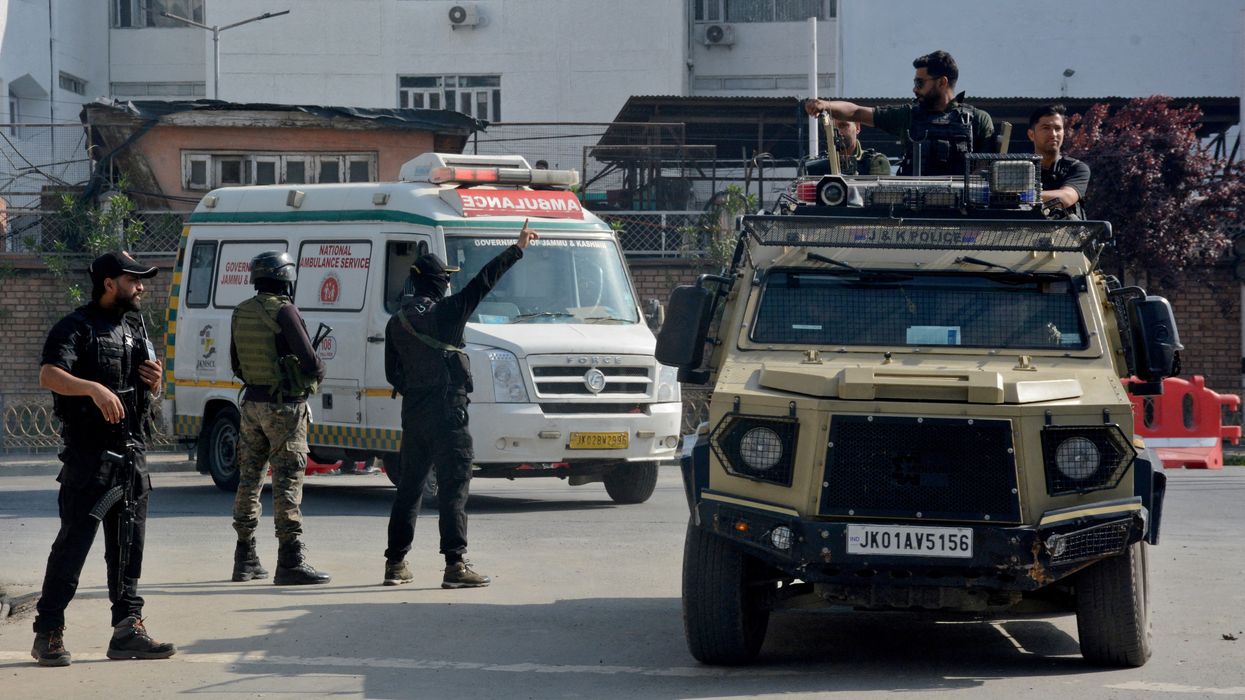INDIAN security forces launched a major search operation on Wednesday, a day after gunmen opened fire on tourists in Kashmir, killing 26 people. The attack was the deadliest on civilians in the region since 2000.
Prime minister Narendra Modi, who returned early from a state visit to Saudi Arabia, condemned the attack and said the attackers “will be brought to justice.”
According to a hospital list verified by police, all 26 victims were men. They were killed on Tuesday afternoon when gunmen emerged from nearby forests at a tourist spot and fired at crowds using automatic weapons.
The bodies were brought to Srinagar on Wednesday in ambulances. Military helicopters searched forested hills for the attackers.
All the deceased were Indian nationals, except for one who was a resident of Nepal.
Jammu and Kashmir chief minister Omar Abdullah said the scale of the attack was “much larger than anything we've seen directed at civilians in recent years.”
No group has claimed responsibility. Armed groups have been active in the region since 1989, demanding either independence or a merger with Pakistan, which also claims the territory.
“This attack on our visitors is an abomination,” Abdullah said. “The perpetrators of this attack are animals, inhuman and worthy of contempt.”
AFP journalists at the site in Pahalgam, about 90 kilometres from Srinagar, reported heavy security deployment.
“The search operation is currently in progress, with all efforts focused on bringing the attackers to justice,” the Indian Army said.
In a separate incident in Baramulla, the army reported a “heavy exchange of fire” during an attempted infiltration across the border from Pakistan. “Two terrorists have been eliminated,” the army said.
A tour guide at Pahalgam told AFP he reached the area after hearing gunfire and helped evacuate some of the injured on horseback.
Waheed, who gave only one name, said he saw several bodies. A witness said the attackers appeared to spare women.
Modi, who had met US vice president JD Vance a day earlier, said, “Their evil agenda will never succeed. Our resolve to fight terrorism is unshakable and it will get even stronger.”
The last major attack on civilians in the region was in March 2000, when 36 people were killed. That incident occurred just before a visit by then US President Bill Clinton.
US President Donald Trump called Modi after Tuesday’s attack and offered “full support to India to bring to justice the perpetrators of this heinous attack.”
Prime Minister Keir Starmer said that the horrific terrorist attack in Kashmir was "utterly devastating." "My thoughts are with those affected, their loved ones, and the people of India," he added in a post on X.
Foreign secretary David Lammy described the attack as a “cowardly” act. "I am appalled by the horrific and cowardly terrorist attack on Kashmir earlier today. My thoughts are with all of those affected, especially those who have lost loved ones," he wrote on X.
In a communication to Indian president Droupadi Murmu and Modi, Putin extended condolences over the terrorist attack in Pahalgam and said the “brutal crime” has no justification whatsoever and its perpetrators will face a deserved punishment.
He expressed “sincere condolences over the tragic consequences of the terrorist attack in Pahalgam whose victims were civilians — citizens of various countries”.
Italian prime minister Meloni said she was “deeply saddened” by the terrorist attack in Pahalgam and expressed solidarity with the affected families, the injured, the Government, and the entire Indian people.
In a post on X, Israeli foreign minister Gideon Sa’ar said his country was “deeply saddened” by the terror attack on tourists in Jammu & Kashmir.
“Deeply saddened by the heinous terror attack on tourists in #Pahalgam, Jammu & Kashmir. Our thoughts are with the victims and their families. Israel stands united with India in the fight against terror,” he said.Around 500,000 Indian soldiers are deployed in Kashmir. Violence has reduced since the region’s autonomy was revoked in 2019.
The government has promoted Kashmir as a tourism destination. In 2024, about 3.5 million tourists visited the region, mostly from within India.
Air India added two extra flights out of Srinagar on Wednesday as tourists attempted to return home.
The worst attack in recent years took place in Pulwama in February 2019, when a suicide bomber killed 40 police personnel.
Analyst Michael Kugelman said the latest incident poses a “very serious risk of a new crisis between India and Pakistan, and probably the most serious risk of a crisis since the brief military conflict that happened in 2019.”
India often accuses Pakistan of supporting armed groups in Kashmir. Pakistan denies this and says it supports the region’s demand for self-determination.
A woman who survived Tuesday’s attack told The Indian Express that men in uniform appeared from the forest and opened fire. Survivors initially believed they were police.
“They were there at least for 20 minutes, undeterred, moving around and opening fire,” the survivor said. “It seemed like an eternity.”
(With inputs from agencies)





